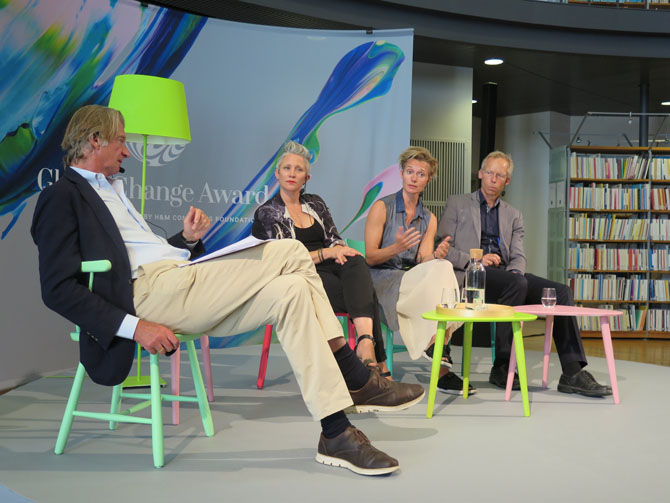Fashion industry shops for innovative ideas
Sustainability is focus of H&M event at KTH

The H&M Conscious Foundation launched the first-ever Global Change Award (GCA) at an exclusive event in the main library at KTH Royal Institute of Technology in Stockholm the 25th of August.
About 120 professionals within fashion, research and innovation were invited to the event, which began with representatives from H&M Conscious Foundation explaining the aim of the GCA: to use this competition, which is open to everyone, to catalyse bold, ground-breaking ideas to promote a circular economy for fashion.
Five winners, chosen by an expert jury, will share a grant of EUR 1 million. They will also receive a one year tailor-made innovation accelerator program provided by KTH and Accenture. The winners will be revealed in February 2016 at a ceremony in Stockholm.
The event proceeded with a round-table discussion on closing the loop for fashion, which featured:
Vigga Svensson – Entrepreneur and founder of Danish company VIGGA, which offers a circular subscription model for organic children’s clothing;
Rebecca Earley – Professor in Sustainable Textiles and Fashion Design at Chelsea College of Art and Design, University of the Arts, London (also a member of the expert jury); and
Johan Rockström – Executive Director of the Stockholm Resilience Centre and a Professor in Environmental Science (also a member of the expert jury).
The discussion was moderated by the well-known Swedish environmentalist Anders Wijkman, who said: “We are at a critical time, where business models have to be turned upside down because the linear business models we have had – take, make and throw away – are not going to work in tomorrow’s world.”
Johan Rockström stressed that all nine planetary boundaries – a framework designed to define a safe operating space for humanity – were related to fashion in some way. “I think the fashion industry has all to do with the transformation towards a sustainable future,” he said. “That’s why I think this award is a very significant initiative.”
Rebecca Earley said that more and more emerging designers were passionate about sustainability, though they found it was not always easy to take their ideas forward in the workplaces. “But in the last few years that has really started to change and companies like H&M have taken a leadership role,” she said.
Vigga Svensson, whose company VIGGA offers organic children’s clothing via a circular business model for a fixed monthly subscription fee, stated that sustainability should be a matter of convenience. “We give parents easy access to organic, super-high-quality baby clothes at a very attractive prize,” she said.
All three panel members agreed that, although there was much left to do, sustainability was becoming a common concern within the fashion industry.
“It’s no longer a question of if we will have circular business models in the future or not, but if the transformation pace is fast enough to avoid catastrophic consequences,” Rockström concluded.
For further information and how to compete with your ideas, please visit: globalchangeaward.com
Benny Ritzén

